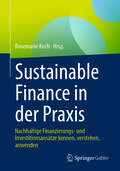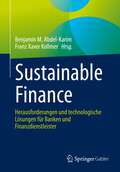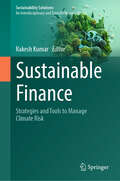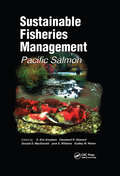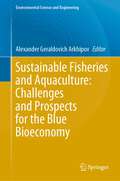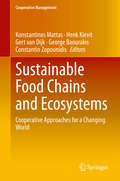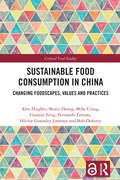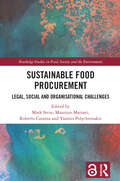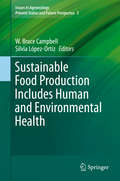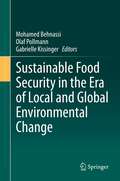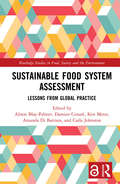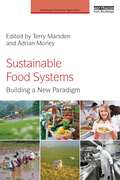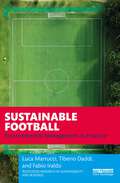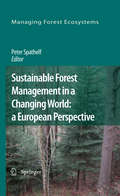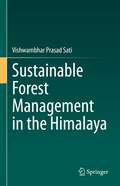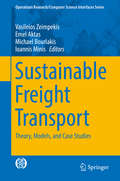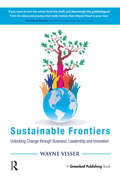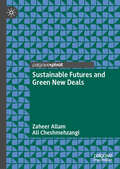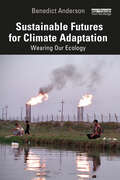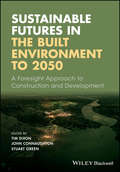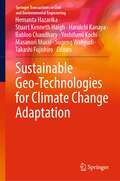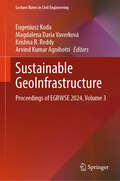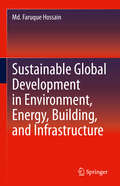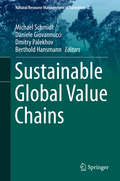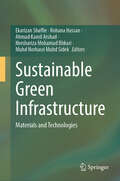- Table View
- List View
Sustainable Finance in der Praxis: Nachhaltige Finanzierungs- und Investitionsansätze kennen, verstehen, anwenden
by Rosemarie KochBei Sustainable Finance geht es darum, Nachhaltigkeitsaspekte – also ökonomische, ökologische und soziale Gesichtspunkte – in finanzielle Entscheidungen einzubinden. Dies wirft sowohl für die wissenschaftliche Betrachtung als auch für die Praxis Fragen auf. Theoretisch fundiert, vor allem aber mit konkreter praxisbezogener Ausrichtung, geht dieses Buch diesen Fragen nach. Es richtet sich an Wissenschaftlerinnen und Wissenschaftler sowie an Praktikerinnen und Praktiker, die einen Überblick über die neuen nachhaltigen Ansätze in der Unternehmensfinanzierung sowie im Bankensektor gewinnen möchten. Privatanlegerinnen und Privatanlegern hilft das Herausgeberwerk, nachhaltige Anlageoptionen kennenzulernen und zu verstehen. Neben Fallstudien berücksichtigt das Buch exklusive Experteninterviews mit Fachleuten aus Banken und DAX-40-Unternehmen, die wertvolle Einblicke in die gegenwärtige Umsetzung nachhaltiger Finanzstrategien in der Wirtschaft gewähren.
Sustainable Finance: Herausforderungen und technologische Lösungen für Banken und Finanzdienstleister
by Benjamin M. Abdel-Karim Franz Xaver KollmerDieses Buch richtet sich an Praktiker, die sich mit den Herausforderungen des Sustainable Finance auseinandersetzen möchten. Der Gedanke, die Banken- und Finanzindustrie nicht nur als Intermediär für "grünes'' Geld, sondern zusätzlich als Katalysator für die Nachhaltigkeitstransformation in den Volkswirtschaften zu nutzen, mutet zunächst als genialer Schachzug an. Allerdings führt eine detaillierte Auseinandersetzung mit den geplanten Inhalten der Gesetzgeber zur Erkenntnis, dass die Details bisher unvollständig sind. Die Abwesenheit von detaillierten Regelwerken und Hilfestellungen zur Umsetzung führt zu einer zusätzlichen Herausforderung für die entsprechenden Akteure entlang der Wertschöpfungsketten der Banken und Finanzmarktindustrie. Damit sind nicht nur Privatanleger vom Transformationsprozess betroffen, die ihr Geld entsprechend anlegen möchten. Insbesondere die Banken- und Finanzdienstleister, die entsprechende Produkte anbieten und beraten, sowie die lokalen Aufsichtsbehörden müssen sich hierzu entsprechend aufstellen. Dieses Buch liefert erste praktische Lösungsansätze, um den Anforderungen des Sustainable Finance für Banken und Finanzdienstleister gerecht zu werden.
Sustainable Finance: Strategies and Tools to Manage Climate Risk (Sustainability Solutions)
by Rakesh KumarThis book will assess existing policies on sustainable finance through contemporary case studies. This will explore how sustainable finance supports sustainable technology, which would reduce climate-related risks like the use of renewable energy sources, sustainable technology, smart home technology incentives, etc. The book will provide in-depth knowledge about various tools of sustainable finance that will reduce climate risk, like green bond policies, green building incentives, carbon tax policies at the national and international level, financial institute incentives for green technology, and many more.This book will provide comprehensive knowledge about the financial investment strategies of financial institutes and the regulatory framework at the government level. This will provide a scientific solution, empirical research, and analysis of the existing framework on sustainable finance aligned with climate risk.
Sustainable Fisheries Management: Pacific Salmon
by E. Eric Knudsen Cleveland R. Steward Donald D. MacDonald Jack E. Williams Dudley W. ReiserWhat has happened to the salmon resource in the Pacific Northwest? Who is responsible and what can be done to reverse the decline in salmon populations? The responsibly falls on everyone involved - fishermen, resource managers and concerned citizens alike - to take the steps necessary to ensure that salmon populations make a full recovery.T
Sustainable Fisheries and Aquaculture: Challenges and Prospects for the Blue Bioeconomy (Environmental Science and Engineering)
by Alexander Geraldovich ArkhipovThe book presents expert assessments of modern opportunities for fisheries and aquaculture in terms of economic efficiency, the state of fishery reservoirs, and the state of ichthyocenoses. The purpose of this book is to provide interested parties (government bodies, representatives of business, science and civil society) with information about modern solutions in the field of aquatic biological resources management, the state of aquatic ecosystems and fish stocks, and modern and promising technologies in aquaculture and fisheries. The book contains an assessment of the state and recommendations for the restoration of natural aquatic ecosystems, an analysis of the state of fisheries and aquaculture in inland waters, taking into account regional characteristics, the development of a methodology for assessing freshwater fish stocks, information on advanced technologies in cage aquaculture in reservoirs and lakes and in circulation systems, data on opportunities for capacity building in small-scale fisheries, and the prospects for establishing a data and information management system for fisheries and aquaculture.
Sustainable Food Chains and Ecosystems: Cooperative Approaches for a Changing World (Cooperative Management)
by Constantin Zopounidis George Baourakis Gert Van Dijk Konstantinos Mattas Henk KievitUnarguably, preserving the ecosystem, securing sustainability and understanding the dynamics of agro-food chains have all become vital policy objectives with several interlinked dimensions. The main objectives of this book are to draw the attention of researchers, policymakers and businesspeople to the relation between agro-food chains and the ecosystem, and to demonstrate the importance of building resilient agro-food chains that take into account climate change and environmental challenges. Agro-food chains as they function today can serve as powerful tools for promoting sustainable forms of agriculture, consumption and production that are embedded in a viable ecosystem. The book addresses a range of environmental, methodological and societal issues from a transaction perspective, while also providing extensive background information on the topic, and outlining future applications and research directions.
Sustainable Food Consumption in China: Changing Foodscapes, Values and Practices (Critical Food Studies)
by Mike Crang Alex Hughes Bob Doherty Guojun Zeng Shuru Zhong Fernando Fastoso Hector Gonzalez JimenezThis book investigates the current and potential roles of food consumption to address sustainability challenges in China.Focusing on the megacity of Guangzhou, it looks at sustainability and food from the perspectives of government, commercial, and third sector actors, and through the lived experiences of consumers. It charts the rapidly transforming landscapes of retail across urban China and the ways they are shaping and are shaped by everyday food consumption practices. Using a multi-method research approach of quantitative and ethnographic data, it provides readers with a rich and comprehensive understanding of the relationships and tensions between contemporary practices of food consumption and pressing sustainability challenges. It unpacks the complex foodscape in contemporary Chinese cities, from traditional wet markets to online deliveries, from supermarkets to farmers markets and alternative food providers, to understand the values and practices promoting and hindering sustainability in food consumption.The book is intended for academics from advanced undergraduate level through to Masters, postgraduates and scholars across key social science disciplines including Geography, Sociology, Anthropology, and Business, and internationally given the global interest in the focus on China.
Sustainable Food Procurement: Legal, Social and Organisational Challenges (Routledge Studies in Food, Society and the Environment)
by Mark Stein Roberto Caranta Maurizio Mariani Yiannis PolychronakisThe book examines sustainable food procurement policy and practice in the European Union and beyond, exploring the extent to which sustainability objectives have been achieved and evaluating the new developments taking place at both EU and national levels.While there is a growing recognition that public authorities can use public procurement as a policy tool to pursue multiple environmental, health and socio-economic objectives, contracting authorities still face many challenges. This volume investigates the scope for pursuing sustainable objectives in public procurement of food and catering services, examining different regulatory contexts and organisational models to answer the overall question of how to integrate sustainability concerns into the various phases of public food procurement processes. Contributions in the book examine the policy and legal procurement framework and practices for sustainable public catering in three EU Member States: Italy, France and Spain. There is a comparative survey of the Baltic Region, including Denmark, Estonia, Finland, Poland and Russia, and moving beyond the EU, there is examination of the UK and Brazil, as well as a cross country comparison of the UK with Denmark and Sweden. Drawing on the expertise of an interdisciplinary and intersectoral team of contributors allows the book to benefit from the insights of different disciplines, including business sciences, anthropology and law. Tapping into the global discussion on public food procurement as a means to achieve multiple social and environmental goals, this work will stimulate readers looking for new creative ways to create value through public food purchasing.This book will be of great interest to students, researchers, policymakers and public- and private-sector representatives interested in public procurement, food policy and law, sustainable food sourcing and supply chain management.
Sustainable Food Production Includes Human and Environmental Health
by W. Bruce Campbell Silvia López-OrtízAgroecology not only encompasses aspects of ecology, but the ecology of sustainable food production systems, and related societal and cultural values. To provide effective communication regarding status and advances in this field, connections must be established with many disciplines such as sociology, anthropology, environmental sciences, ethics, agriculture, economics, ecology, rural development, sustainability, policy and education, or integrations of these general themes so as to provide integrated points of view that will help lead to a sustainable construction of values. Such designs are inherently complex and dynamic, and go beyond the individual farm to include landscapes, communities, and biogeographic regions by emphasizing their unique agricultural and ecological values, and their biological, societal, and cultural components and processes.
Sustainable Food Security in the Era of Local and Global Environmental Change
by Mohamed Behnassi Gabrielle Kissinger Olaf PollmannThis volume discusses a broad range of vital issues encompassing the production and consumption of food in the current period of climate change. All of these add up to looming, momentous challenges to food security, especially for people in regions where malnutrition and famine have been the norm during numerous decades. Furthermore, threats to food security do not stop at the borders of more affluent countries - governance of food systems and changes in eating patterns will have worldwide consequences. The book is arranged in four broad sections. Part I, Combating Food Insecurity: A Global Responsibility opens with a chapter describing the urgent necessity for new paradigm and policy set to meet the food security challenges of climate change. Also in this section are chapters on meat and the dimensions of animal welfare, climate change and sustainability; on dietary options for mitigating climate change; and the linkage of forest and food production in the context of the REDD+ approach to valuation of forests. Part II, Managing Linkages Between Climate Change and Food Security offers a South Asian perspective on Gender, Climate Change and Household Food Security; a chapter on food crisis in sub-Saharan Africa; and separate chapters on critical issues of food supply and production in Nigeria, far-Western Nepal and the Sudano-Sahelian zone of Cameroon. Part III examines Food Security and patterns of production and consumption, with chapters focused on Morocco, Thailand, Bahrain, Kenya and elsewhere. The final section discusses successful, innovative practices, with chapters on Food Security in Knowledge-Based Economy; Biosaline Agriculture in the Gulf States; Rice production in a cotton zone of Benin; palm oil in the production of biofuel; and experiments in raised-bed wheat production. The editors argue that technical prescriptions are insufficient to manage the food security challenge. They propose and explain a holistic approach for adapting food systems to global environmental change, which demands the engagement of many disciplines - a new, sustainable food security paradigm.
Sustainable Food System Assessment: Lessons from Global Practice (Routledge Studies in Food, Society and the Environment)
by Damien Conaré Blay-Palmer Alison Ken Meter Carla Johnston Amanda BattistaSustainable Food System Assessment provides both practical and theoretical insights about the growing interest in and response to measuring food system sustainability. Bringing together research from the Global North and South, this book shares lessons learned, explores intended and actual project outcomes, and highlights points of conceptual and methodological convergence. Interest in assessing food system sustainability is growing, as evidenced by the Milan Urban Food Policy Pact and the importance food systems initiatives have taken in serving as a lever for attaining the UN Sustainable Development Goals. This book opens by looking at the conceptual considerations of food systems indicators, including the place-based dimensions of food systems indicators and how measurements are implicated in sense-making and visioning processes. Chapters in the second part cover operationalizing metrics, including the development of food systems indicator frameworks, degrees of indicator complexities, and practical constraints to assessment. The final part focuses on the outcomes of assessment projects, including impacts on food policy and communities involved, highlighting the importance of building connections between sustainable food systems initiatives. The global coverage and multi-scalar perspectives, including both conceptual and practical aspects, make this a key resource for academics and practitioners across planning, geography, urban studies, food studies, and research methods. It will also be of interest to government officials and those working within NGOs.
Sustainable Food Systems: Building a New Paradigm (Earthscan Food and Agriculture)
by Terry Marsden Adrian MorleyIn response to the challenges of a growing population and food security, there is an urgent need to construct a new agri-food sustainability paradigm. This book brings together an integrated range of key social science insights exploring the contributions and interventions necessary to build this framework. Building on over ten years of ESRC funded theoretical and empirical research centered at BRASS, it focuses upon the key social, economic and political drivers for creating a more sustainable food system. Themes include: regulation and governance sustainable supply chains public procurement sustainable spatial strategies associated with rural restructuring and re-calibrated urbanised food systems minimising bio-security risk and animal welfare burdens. The book critically explores the linkages between social science research and the evolving food security problems facing the world at a critical juncture in the debates associated with not only food quality, but also its provenance, vulnerability and the inherent unsustainability of current systems of production and consumption. Each chapter examines how the links between research, practice and policy can begin to contribute to more sustainable, resilient and justly distributive food systems which would be better equipped to ‘feed the world’ by 2050.
Sustainable Football: Environmental Management in Practice (Routledge Research in Sustainability and Business)
by Tiberio Daddi Fabio Iraldo Luca MarrucciThis book provides a comprehensive, up-to-date overview of the different environmental strategies adopted in the football world to foster sustainability. The authors lay out useful insights, both for scholars and practitioners, to improve good governance in football organisations by empowering environmental organisational and operational actions. As well as examining practical methods of implementing green initiatives, the book discusses their added value from different perspectives including football fans, football managers and policymakers. By identifying the most important green actions for the dissemination of environmentally friendly behaviours at both individual and organisational levels, the book demonstrates how football organisations can use operational and organisational methods to develop an environmental sustainability strategy. The book contributes to developing the role of the football world by covering different facets of sustainability such as the circular economy, climate change, green marketing, fans engagement and more. It will be a valuable resource for scholars and students of environmental management, sustainable business and corporate social responsibility, as well as professionals working in the football industry.
Sustainable Forest Management in a Changing World: a European Perspective
by Peter SpathelfWith its 250-year history, Sustainable Forest Management (SFM) is now viewed as a model for managing forests worldwide. Yet despite the frequent use of the term there remain many questions concerning its meanings, criteria as well as its practical application. This book explores the current potential of SFM within the context of the rapid changes occurring in our natural and social environment, and examines the broad range issues - climate change, finance, governance, policy, certification, reduced-impact logging, non-timber products and services and stakeholder participation in land-use decisions - within the context of forest use, functions and conservation. With contributions from high-level representatives from the World Bank, FAO, IUCN and UNEP, as well as from leading academics - and including case studies from Europe and the tropics - this timely synthesis will provide a valuable reference for advanced students and researchers interested in forest and natural resource management, participatory and extension research, forest ecology and ecosystem services, functions and values, as well as for those involved in forest policy at local, regional and international levels. 'Every so often, a discipline should take stock where we are and where we are going. This book is doing that in a very timely manner. As we gain an appreciation of the magnitude and implications of future changes, the authors present views and ideas on a wide range of topics related to sustainable forest management. They provide a much needed overview of challenges in the face of climate and other aspects of global change. The book incorporates recent advances in a variety of fields and provides suggestions for solutions to important management problems that range from theoretical approaches to practical applications.' Klaus J. Puettmann, Department of Forest Ecosystems and Society, Oregon State University, Corvallis, USA.
Sustainable Forest Management in the Himalaya
by Vishwambhar Prasad SatiThis volume presents a comprehensive description of forests of the Uttarakhand Himalaya. It looks into the major drivers of forest depletion and suggests paths toward sustainable forest management. The book comprises thirteen chapters, which together describe forest land use/cover change; forest classification and working circles; national parks, wildlife sanctuaries, and conservation reserves; forest diversity and distribution; forest stocks and products; ecosystem goods and services; environmental index; drivers of forest degradation and conservation; climate change and forests; cultural and economic significance of forests, and sustainable forest management. The text is richly complemented by nearly seventy photographs and figures.
Sustainable Freight Transport: Theory, Models, And Case Studies (Operations Research/computer Science Interfaces Ser. #63)
by Michael Bourlakis Vasileios Zeimpekis Ioannis Minis Emel AktasThis book presents the latest technologies and operational methods available to support sustainable freight transport practices. It highlights market requirements, cutting edge applications, and case studies from innovators in the logistics services industry. The goal is to help bridge the gap between advanced computational techniques and complex applied problems such as those in sustainable transport and logistics operations. Freight transport has traditionally focused on costs and service levels. However, it is no longer possible or socially responsible to neglect the environmental, social, climate, and energy implications of the freight moving globally. This book places sustainability at the forefront of the freight transport agenda. Sustainable Freight Transport: Theory, Models and Case Studies is divided into three sections. Section I focuses on green freight transport policies for air and marine ports. Section II is devoted to using modelling techniques and optimization for achieving sustainable freight transport, while Section III examines policies to support sustainable freight transport practices in urban areas. The contributions come from authors from different areas, backgrounds, and countries to cover a global perspective.
Sustainable Frontiers: Unlocking Change through Business, Leadership and Innovation (Business Frontiers Ser.)
by Wayne VisserSustainable Frontiers throws down the gauntlet to business to step up and be the catalyst for a sustainable future. It presents eight keys to unlocking transformational change – through leadership, enterprise, innovation, transparency, engagement, responsibility, integration and future-fitness. Far from being another tame review of corporate social responsibility and sustainable business initiatives, the book dispels the myths of sustainability and challenges us to let go of old systems that are failing to deliver economic, social and environmental transformation. Sustainable Frontiers gets to the heart of why the sustainability and CSR movements have failed in the past and offers a new view of how sustainable business practices can shape-shift to make a genuine difference inside and outside organisations. The book gathers together experiences from across the globe and shows to the reader what can be achieved with the right vision and leadership. Expect to be challenged, engaged and inspired to join the revolution on the sustainable frontier.Making a successful transition to a more sustainable future depends on letting go. Sustainable Frontiers shows how we must find ways to let go of an industrial system that has served us well, but is no longer fit for purpose. How we will need to let go of old styles of leadership and out-dated models of business, high-impact lifestyles and selfish values. How we must learn to let go of cherished ideologies that are causing destruction and beliefs about ways to tackle problems that are failing to resolve crises.If we are to reach sustainable frontiers, it must begin with changing our collective minds - and only then will we change our collective behaviour. How we accomplish such a global mind-shift is the subject of Sustainable Frontiers. And it starts by admitting that those of us at the vanguard of the sustainability revolution also have to change. We will also have to let go of cherished beliefs and strategies that are not working - starting with the way we communicate our vital, life-saving mission.
Sustainable Futures and Green New Deals
by Ali Cheshmehzangi Zaheer AllamThis academic book critically examines the concept of sustainable futures and its interdependence with the policy framework of Green New Deals. We emphasize the inherent link between the two concepts by highlighting how Green New Deals can pave the way for a sustainable and just future in key areas such as environmental policy, economic development, and social equity. Taking a multidisciplinary approach, the book draws on insights from fields such as environmental studies, sustainable development, political ecology, and climate policy to explore the intricacies of these interconnections. The revised description underscores the importance of understanding the Green New Deal's historical and political contexts, as well as its implications for sustainable futures. The book delves into the theoretical perspectives that shape our comprehension of sustainable futures, the diverse strategies employed by countries and regions in implementing Green New Deals, the role of technological innovation and social movements in fostering sustainable transitions, and the political dynamics surrounding the Green New Deal. Through an analysis of the Green New Deal's role in sustainable development, climate policy, and environmental justice, the book provides a necessary and timely contribution to ongoing debates. The chapters offer detailed explorations of the interrelationships between these key areas, emphasizing how the Green New Deal can serve as a transformative policy framework for achieving sustainable and equitable futures. "Sustainable Futures and Green New Deals" is intended for scholars, policymakers, activists, and students interested in understanding the complex and interconnected issues surrounding sustainable development, climate policy, and environmental justice.
Sustainable Futures for Climate Adaptation: Wearing Our Ecology
by Benedict AndersonConsidering sustainability as a flawed and restrictive term in practice, Sustainable Futures for Climate Adaptation argues that we must radically adapt humanity and reform society, cities, buildings, and our approach to migration in order to coexist in harmony with our natural environments. The book conceives an Earth–human coexistence where the world’s regions are shared globally between all people, in contrast to a reality where we have lost touch with the natural world. It is this decoupling of humanity and nature that has brought us to the brink of climate disaster. In response, Benedict Anderson explores the concept of ‘wearing our ecology’, where human mobility is synchronized with the environment, merging people with landscapes, topographies, and geographies. Anderson argues that we need to create new migration routes for people moving between the Global South and North and establish flexible and adaptive living environments. Only by rethinking separations between urban and rural, resource extraction and consumption, racial prejudice and accessibility are we able to forge a closer partnership with nature to adapt to climate change and mitigate the worst of its effects. Touching on themes of adaptive urban design, racial and gender segregation and inequality, and climate apocalypticism, this book will be valuable reading for researchers, scholars, and upper-level students in the fields of urban studies, migration studies, human geography, ecology, politics, and design.
Sustainable Futures in the Built Environment to 2050: A Foresight Approach to Construction and Development
by Tim Dixon John Connaughton Stuart GreenBrings together leading thinking on issues of new professional practice and on the future of a sustainable built environment This book focuses on both construction and development issues, and examines how we can transition to a sustainable future by the year 2050—bringing together leading research and practice at building, neighbourhood, and city levels. It deftly analyses how emerging socio-economic, technological, and environmental trends will influence the built environment of the future. The book covers a broad spectrum of interests across the scales of buildings, communities and cities, including how professional practice will need to adapt to these trends. The broader context is provided by an analysis of emergent business models and the changing requirements for expert advice from clients. Sustainable Futures in the Built Environment to 2050: A Foresight Approach to Construction and Development features chapters covering: data and trends, including historical data and UK and international case studies; policies and practice related to the field; current state of scientific understanding; key challenges; key technological advances (including disruptive and systemic technological innovations); change issues and critical uncertainties; and future visions. It provides: A strong conceptual framework based on a ‘Foresight' approach Discussion of the key data and trends that underpin each chapter Coverage of both construction and property development Specially commissioned chapters by academics and practitioners A synthesis of the main findings in the book and key insights for the future to 2050 Sustainable Futures in the Built Environment to 2050: A Foresight Approach to Construction and Development is an important book for postgraduate students and researchers, construction, real estate and property development specialists, engineers, planners, architects, foresight and futures studies specialists, and anyone involved in sustainable buildings.
Sustainable Geo-Technologies for Climate Change Adaptation (Springer Transactions in Civil and Environmental Engineering)
by Hemanta Hazarika Stuart Kenneth Haigh Haruichi Kanaya Babloo Chaudhary Yoshifumi Kochi Masanori Murai Sugeng Wahyudi Takashi FujishiroThis edited volume is a compilation of peer-reviewed papers of the plenary lectures, keynote lectures, special lectures and young researcher’s special lectures delivered at the 1st International Symposium on Construction Resources for Environmentally Sustainable Technologies (CREST 2020) organized by Kyushu University, Fukuoka, Japan. The book focuses on sustainability, promotion of new ideas and innovations in design, construction and maintenance of geotechnical structures with the aim of contributing towards climate change adaptation and disaster resiliency to meet the UN Sustainable Development Goals (SDGs). It presents latest research, information, technological advancement, practical challenges encountered, and solutions adopted in the field of geotechnical engineering for sustainable infrastructure towards climate change adaptation. This volume will be of interest to those in academia and industry alike.
Sustainable GeoInfrastructure: Proceedings of EGRWSE 2024, Volume 3 (Lecture Notes in Civil Engineering #583)
by Krishna R. Reddy Arvind Kumar Agnihotri Eugeniusz Koda Magdalena Daria VaverkováThis volume contains peer-reviewed and selected papers presented during the International Conference on Environmental Geotechnology, Recycled Waste Materials, and Sustainable Engineering 2024, held in Warsaw, Poland. It covers the recent innovations, trends, concerns, practical challenges encountered, and the solutions adopted in waste management and engineering, geotechnical and geoenvironmental engineering, infrastructure engineering, and sustainable engineering. This book will be useful for academics, educators, policymakers, and professionals working in the field of civil engineering, chemical engineering, environmental sciences, and public policy.
Sustainable Global Development in Environment, Energy, Building, and Infrastructure
by Md. Faruque HossainThis book emphasizes the comprehensive application of sustainability for all sectors of Environment, Energy, Building, and Infrastructure to secure a well-balanced world. Hence, the goal of this book is to define the context of instigation to think through the scientific theories and practical technical applications of the sustainable mechanism to confirm the global sustainability by implementation of the following six themes, Chapter 1: Introduction; Chapter 2: Sustainable Environment; Chapter 3: Sustainable Energy; Chapter 4. Sustainable Building; 5. Sustainable Infrastructure; Chapter 6: Conclusion; which are very much interconnected to secure the global sustainability. Consequently, the importance of the application of sustainability in all sectors of these six sectors has been expedited in this book considering the wise application of technologies by trickling down the advancement thoughts, research, and practices to achieve a broader result to build a better world.
Sustainable Global Value Chains (Natural Resource Management in Transition #2)
by Robert AtkinsonValue chains are a vital part of how our world operates, yet we are only beginning to understand how to make them sustainable. This volume addresses the crux of that challenge by presenting a broad array of options for understanding and managing the complexity of sustainability initiatives that affect, and are also influenced by value chains. Its chapters present diverse perspectives on both political and private sector governance, including governmental regulations and private standards, and embrace the emergent and critical value of innovative approaches to monitoring and evaluating progress. Finally, the volume offers a review of concrete examples for transformation and transition towards more sustainable value chains in selected sectors, including, amongst others, agriculture, forestry, mining, and tourism.
Sustainable Green Infrastructure: Materials and Technologies
by Rohana Hassan Ahmad Kamil Arshad Muhd Norhasri Muhd Sidek Norshariza Mohamad Bhkari Ekarizan ShaffieThis book highlights the integration of eco-friendly infrastructure, innovative materials, and advanced technologies to build sustainability and resilience in both urban and rural environments. It explores the sustainability principles, highlighting how green infrastructure can reduce environmental impacts, improve quality of life, and ensure long-term ecological balance. The text emphasizes the importance of technological innovations in achieving sustainable development goals, offering insights into the latest advancements and their applications in creating resilient communities. It significantly contributes to the field by offering in-depth insights into sustainable development across various domains, including timber, pavement, construction, and technology. This volume is a crucial addition to existing literature, serving as an essential reference for future research and application in green infrastructure, materials, and technologies. Its wide-ranging content makes it an indispensable resource for professionals, scholars, and students dedicated to progressing the areas of green infrastructure and sustainable technological practices.
